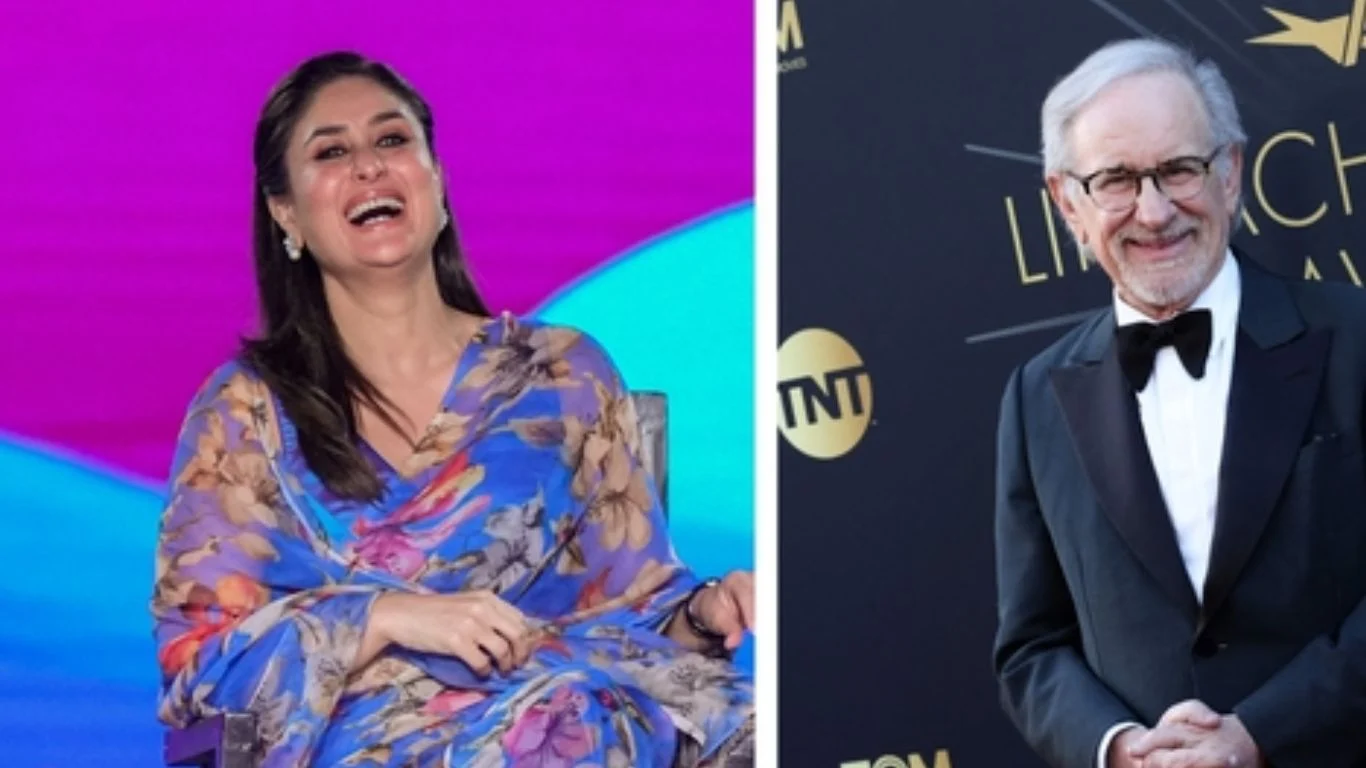
At the inaugural World Audio Visual and Entertainment Summit (WAVES) 2025, held at the Jio World Convention Centre in Mumbai, actor Kareena Kapoor Khan shared a defining moment from her career that reflects not only her individual success but also the increasing global visibility of Indian cinema. While participating in the “Cinema: The Soft Power” panel discussion moderated by filmmaker Karan Johar and featuring Telugu cinema’s Vijay Deverakonda, Kareena recounted an unforgettable encounter with legendary Hollywood filmmaker Steven Spielberg—an incident that underscored the cross-cultural appeal of Indian films and how far their narratives have reached. Recalling the experience with evident pride and enthusiasm,
Kareena described how she once ran into Spielberg at a restaurant during a trip abroad—an interaction that took place shortly after the release of *3 Idiots*, one of her most celebrated films. According to her account, Spielberg approached her and asked, “Are you the girl in that very famous Indian film about three students?” When she responded in the affirmative, he reportedly said, “My God, I loved that movie.” For Kareena, who didn’t need to act in an English film to be recognized by one of Hollywood’s most revered directors, the moment marked a significant validation of her work and of Indian cinema’s growing resonance beyond domestic audiences. This wasn’t Spielberg’s first brush with *3 Idiots*. In fact, in a 2013 interview with,
he acknowledged watching the film three times, praising its emotional depth and placing it in a personal list of favorites—alongside cinematic greats such as *E.T. the Extra-Terrestrial* and *Saving Private Ryan*. Such recognition, coming from a filmmaker of Spielberg’s caliber, highlights the universal relevance and narrative brilliance of *3 Idiots*, directed by Rajkumar Hirani and starring Aamir Khan, R. Madhavan, Sharman Joshi, and Kareena herself. Released in 2009, *3 Idiots* swiftly became a cultural phenomenon in India and beyond, not just for its compelling storytelling but also for its poignant critique of the Indian education system and its message encouraging the pursuit of passion over societal expectations.
Its blend of humor, emotional gravitas, and relatable characters made it immensely popular across demographics, and its success in overseas markets like China, where it broke box office records for a foreign film, affirmed its status as a global cinematic gem. Kareena’s anecdote with Spielberg is symbolic of this crossover success, illustrating how Indian films can speak powerfully to international audiences, even without the conventional vehicles of Hollywood distribution. The WAVES 2025 summit itself served as a platform to celebrate and examine such phenomena. Launched by Prime Minister Narendra Modi, the four-day event brought together luminaries from across the Indian entertainment spectrum—Shah Rukh Khan, Aamir Khan,
Deepika Padukone, Rajinikanth, Alia Bhatt, Ranbir Kapoor, Chiranjeevi, Mohanlal, Hema Malini, Akshay Kumar, and many others—to discuss the soft power of cinema, its role in shaping global perceptions, and its potential for diplomatic and cultural outreach. For Kareena, who has played a range of roles in Indian cinema—from the spirited Geet in *Jab We Met* to the intelligent and empathetic Pia in *3 Idiots*—her journey reflects a career that straddles both critical acclaim and mass appeal. Her presence on the WAVES panel not only affirmed her status as a leading actress but also positioned her as a cultural ambassador capable of representing Indian cinema on the world stage. Spielberg’s acknowledgment adds to a growing list of international accolades that Indian films and artists have received in recent years, as platforms like Netflix, Amazon Prime Video,
and international film festivals continue to amplify India’s storytelling voice. Moreover, the timing of this recognition—during a summit focused on audiovisual excellence and global collaboration—dovetailed perfectly with the broader mission of WAVES: to showcase how Indian narratives are increasingly influencing global cinema and how technology, storytelling, and talent are coalescing to redefine what it means to be a film powerhouse in the 21st century. Kareena’s story is not just a personal milestone but a reflection of the evolving dynamics of Indian cinema’s role on the global stage. Her ability to captivate audiences—and even the world’s most respected directors—without venturing outside her national industry proves the potency of authentic storytelling and the shifting landscape of global recognition. It’s no longer necessary for Indian actors to make their mark in Hollywood to be considered global stars; instead, their work at home is now traveling farther and resonating deeper, thanks to digital platforms and increasing cultural curiosity. In conclusion,
Kareena Kapoor Khan’s anecdote about being recognized by Steven Spielberg serves as a poignant reminder of cinema’s universal language and its power to connect artists, cultures, and audiences across borders. It’s a story that not only celebrates an individual’s achievement but also underscores the transformative moment Indian cinema finds itself in—one where stories rooted in local contexts are gaining global admiration, and where a film about “three students” can transcend its cultural setting to touch the hearts of moviegoers and master storytellers alike. This intersection of art and recognition, of East meeting West without assimilation but through mutual respect, is perhaps the most powerful takeaway from Kareena’s experience, and a fitting narrative to emerge from a summit dedicated to celebrating cinema’s global influence.

















